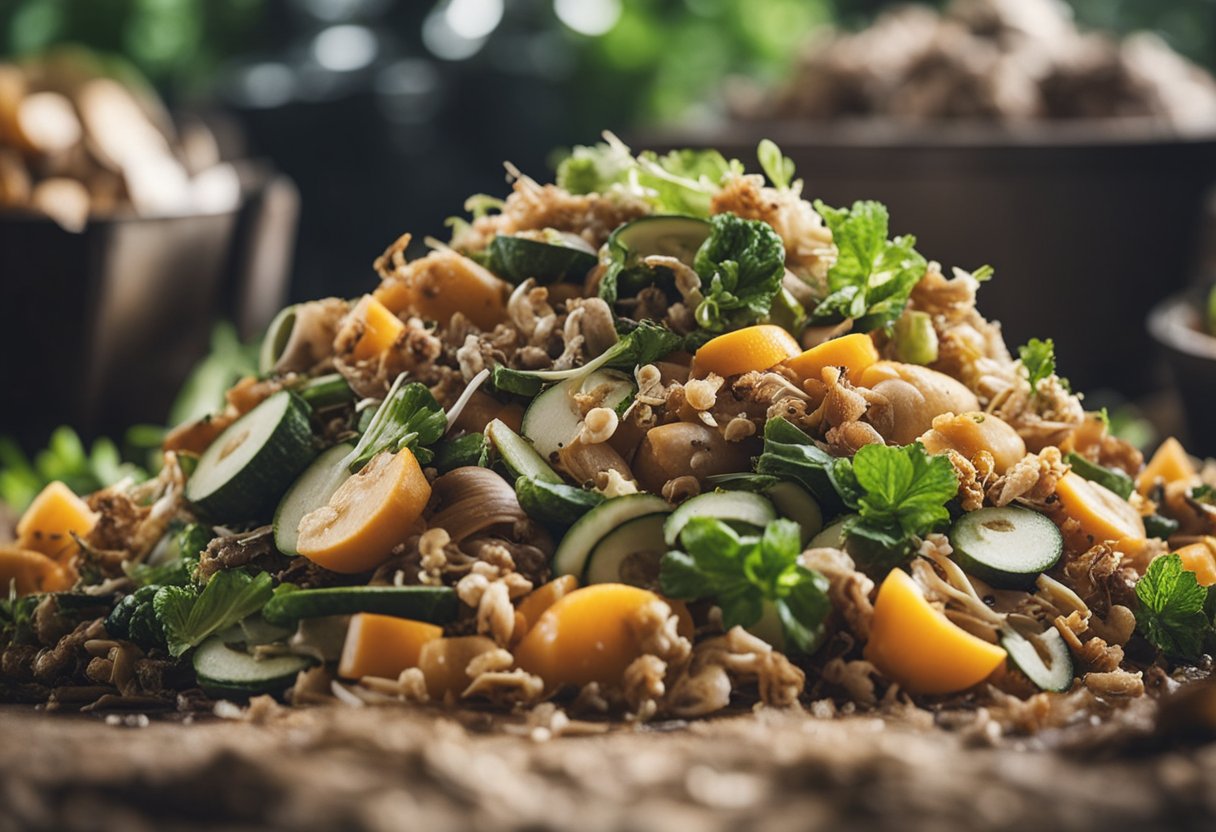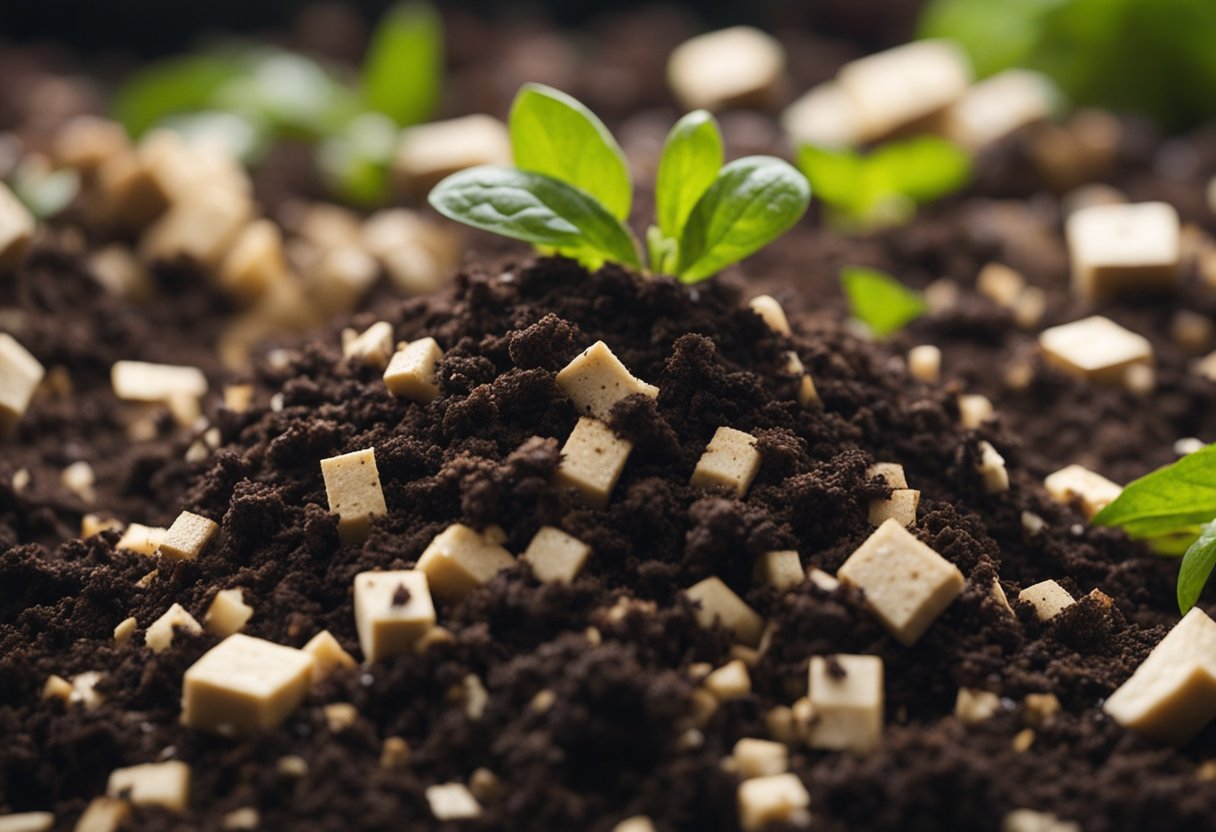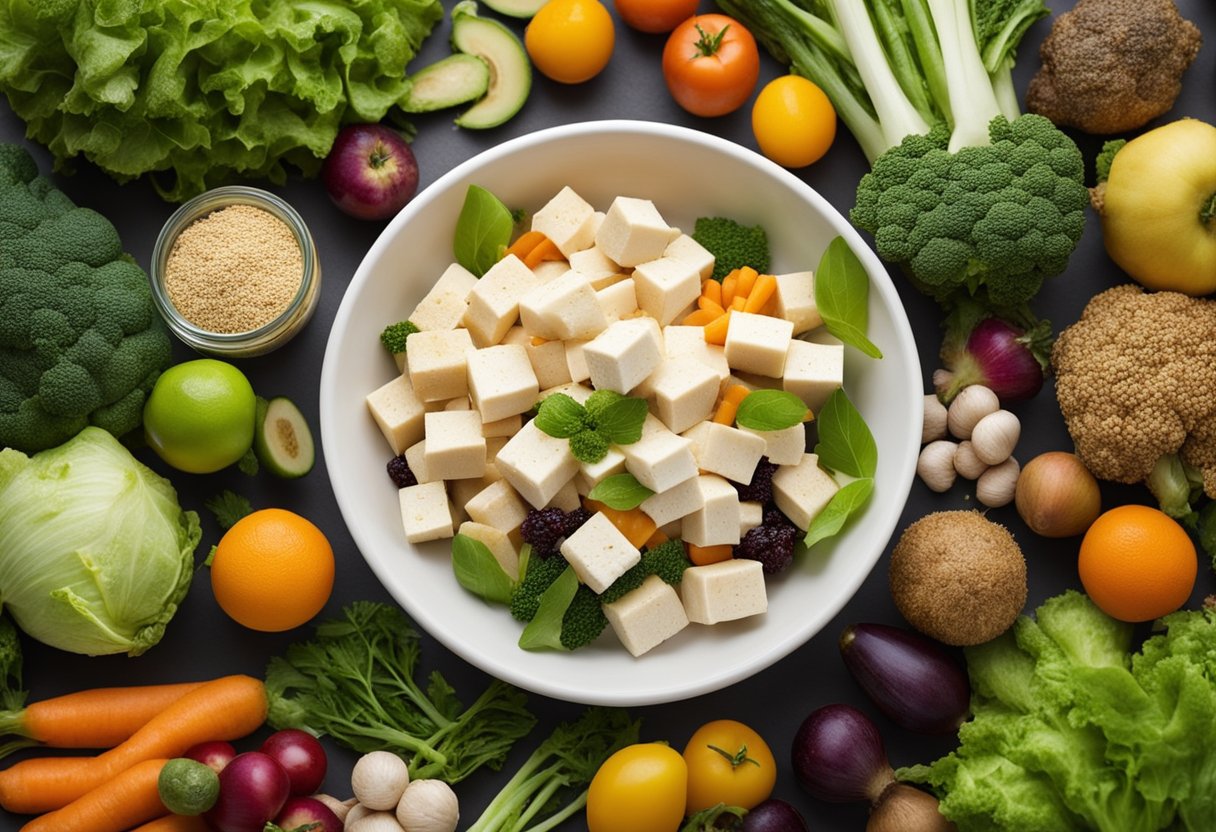As an Amazon Associate I earn from qualifying purchases.
At A Glance
Yes, you can compost tofu. Tofu is an organic material made from soybeans, and it will break down in a compost pile. Since tofu is a protein-rich food, it falls under the category of “green” compost materials that provide necessary nitrogen for the composting process. However, composting tofu might attract pests and rodents, so it’s advisable to bury it well within the compost pile or consider using a composting system with a lid to deter pests.
Composting is a great way to reduce waste and create nutrient-rich soil for your garden. However, not all materials are suitable for composting. One question that often arises is whether or not tofu can be composted. As someone who is passionate about sustainability and gardening, I was curious to find out the answer.

After conducting some research, I can confidently say that tofu can be composted. Tofu is made from soybeans, which makes it a great addition to your compost pile. However, it’s important to keep in mind that not all composting materials are created equal. Understanding the nutrient content of tofu is crucial in ensuring successful composting.
There are two types of composting ingredients: “browns” and “greens.” Browns, such as twigs and shredded paper, are high in carbon, while greens, such as nitrogen-rich vegetables, are abundant in protein. Tofu is considered a green material because it contains nitrogen. When composting tofu, it’s important to maintain the right balance of brown and green composting materials in your bin.
Understanding Composting

Composting is a natural process of recycling organic matter into a nutrient-rich soil amendment. It involves the decomposition of organic materials such as food scraps, yard waste, and other organic materials. Composting is a great way to reduce waste and create healthy soil for your garden.
Compost
Compost is the end result of the composting process. It is a dark, crumbly, and nutrient-rich material that is great for improving soil quality. Compost is made up of a combination of carbon-rich materials, such as leaves and straw, and nitrogen-rich materials, such as food scraps and grass clippings.
Carbon and Nitrogen
The key to making healthy compost is to maintain the right balance of carbon and nitrogen. Carbon-rich materials are often referred to as “browns,” while nitrogen-rich materials are referred to as “greens.” The ideal carbon to nitrogen ratio for a healthy compost pile is 30:1.
Tofu is considered a “green” material because it is high in nitrogen. It has a carbon to nitrogen ratio of 12:1, which means it is a good addition to a compost pile. However, it’s important to balance it with other carbon-rich materials such as leaves or shredded paper to maintain a healthy compost pile.
Microorganisms in Composting
Composting relies on the activity of microorganisms such as bacteria and fungi to break down organic matter into compost. These microorganisms thrive in a warm, moist environment. It’s important to maintain the right moisture level in your compost pile to ensure that the microorganisms can do their job.
In conclusion, composting is a natural process that involves the decomposition of organic matter into nutrient-rich soil amendment. Tofu is considered a “green” material and can be added to a compost pile as long as it’s balanced with other carbon-rich materials. Maintaining the right balance of carbon and nitrogen and the right moisture level is key to creating healthy compost.
Materials for Composting
When it comes to composting, there are a variety of materials that can be used to create a healthy and nutrient-rich soil amendment. These materials are typically divided into two categories: greens and browns.
Greens and Browns
Greens are materials that are high in nitrogen and include things like vegetable scraps, food waste, coffee grounds, tea bags, flowers, and weeds. Browns are materials that are high in carbon and include things like paper, wood chips, cardboard, newspaper, sawdust, and straw.
To create a healthy compost pile, it’s important to have a good balance of greens and browns. A good rule of thumb is to have about 2/3 browns and 1/3 greens in your compost pile.
Paper and Wood
Paper and wood products can also be used in composting. Shredded paper, cereal boxes, paper plates, and napkins can all be added to the compost pile. Wood ash, wood chips, and sawdust can also be used, but it’s important to make sure they are untreated and free from chemicals.
Food Waste
Food waste is an excellent addition to compost. Bread, cereal, pasta, rice, eggshells, beans, corn cobs, and vegetables can all be added to the compost pile. It’s important to avoid adding meat, dairy, and oily foods, as they can attract pests and slow down the composting process.
Other Compostable Materials
Other materials that can be added to the compost pile include dead houseplants, egg cartons, hair, feathers, cotton, wool, dryer lint, manure, seaweed, pine needles, and leather. It’s important to avoid adding materials that are treated with chemicals or that have been contaminated with pesticides or herbicides.
By using a variety of materials and maintaining a good balance of greens and browns, it’s possible to create a nutrient-rich compost that can be used to improve soil health and grow healthy plants.
Can You Compost Tofu
What is Tofu
Tofu, also known as bean curd, is a popular plant-based protein source made from soybeans. It is a versatile ingredient used in many cuisines and is known for its mild flavor and soft texture. Tofu is a great source of protein and contains essential amino acids, iron, and calcium.
Composting Tofu
Yes, you can compost tofu. Tofu is a great addition to your compost pile because it is high in nitrogen, which is an essential nutrient for healthy plant growth. When composting tofu, it is important to balance the carbon-to-nitrogen ratio in your compost pile. Tofu is considered a “green” material, which means it is high in nitrogen. To balance this, you should add “brown” materials, such as dried leaves, shredded paper, or straw, which are high in carbon.
To compost tofu, simply add it to your compost bin or pile along with other organic materials. Tofu will break down quickly, usually within a few weeks, and will help create nutrient-rich compost that can be used to fertilize your garden or houseplants.
Potential Problems
While composting tofu is generally a straightforward process, there are a few potential problems to be aware of. Tofu can attract pests such as rodents and insects, so it is important to keep your compost bin covered and secure. Additionally, tofu can produce an unpleasant odor as it decomposes, so it is important to mix it well with other materials and avoid adding too much at once. Finally, if you notice any critters or pests in your compost pile, it may be a sign that your compost is too wet or has an imbalance of materials. In this case, you may need to adjust the ratio of greens to browns or add more dry materials to your compost pile.
In summary, composting tofu is a great way to reduce food waste and create nutrient-rich soil for your plants. By following a few simple guidelines and being mindful of potential problems, you can successfully compost tofu and enjoy the benefits of healthy, thriving plants.
Composting Other Proteins

When it comes to composting, proteins can be a tricky ingredient. While they can add valuable nutrients to the soil, they can also attract pests and create unpleasant odors. Here are some tips for composting other proteins:
Composting Meat
Meat can be composted, but it should be done with caution. Meat scraps can attract rodents and other pests, so it’s important to bury them deep in the compost pile and cover them with other organic materials. It’s also a good idea to avoid adding large quantities of meat at once, as this can cause the pile to become anaerobic and produce unpleasant odors.
Composting Dairy Products
Dairy products, such as milk and cheese, can also be composted. However, like meat, they can attract pests and create unpleasant odors. To compost dairy products, it’s important to bury them deep in the pile and cover them with other organic materials. It’s also a good idea to avoid adding large quantities of dairy at once.
Composting Plant-Based Proteins
Plant-based proteins, such as beans and tofu, are excellent additions to the compost pile. They are high in nitrogen and can help to speed up the composting process. However, it’s important to chop them up into small pieces before adding them to the pile, as this will help them to break down more quickly. Cooked beans and tofu can also be composted, but it’s best to avoid adding any seasonings or sauces.
In general, it’s important to avoid adding any bones, grease, or cooked meat to the compost pile, as these can attract pests and create unpleasant odors. It’s also a good idea to avoid adding any Jell-O or other gelatin products, as these can take a long time to break down. By following these tips, you can compost a variety of proteins and create nutrient-rich soil for your garden.
Maintaining Your Compost Pile
Mixing and Moisture
Maintaining the right moisture level and mixing your compost pile are two important factors in successful composting. A good rule of thumb is to keep your compost pile moist, but not too wet. If your compost pile is too dry, it will not break down properly. On the other hand, if your compost pile is too wet, it can become anaerobic, which means that there is not enough oxygen for the microbes to break down the materials.
To ensure that your compost pile stays moist, you can add water as needed. It is also important to mix your compost pile regularly to ensure that the materials are evenly distributed and the microbes have access to all the materials. Mixing your compost pile also helps to aerate the pile, which provides the microbes with the oxygen they need to break down the materials.
Adding Nutrients
Adding nutrients to your compost pile is important to ensure that the microbes have the necessary materials to break down the organic matter. Tofu is a good source of nutrients such as calcium, iron, and magnesium, which can help to enrich your compost pile.
In addition to tofu, you can also add other organic materials such as leaves, grass clippings, and food scraps to provide a balanced mix of nitrogen and carbon for your compost pile.
Worms and Composting
Worms can be a great addition to your compost pile as they help to break down the materials and add nutrients to the compost. Worms consume organic matter and excrete nutrient-rich castings that can help to enrich your compost pile.
To attract worms to your compost pile, you can add organic materials such as leaves, grass clippings, and food scraps. You can also purchase worms specifically for composting, such as red wigglers.
Overall, maintaining a healthy compost pile requires proper mixing, moisture, and nutrient balance. By following these tips and adding tofu and other organic materials to your compost pile, you can create nutrient-rich compost that can help to enrich your garden and reduce waste.
Benefits of Composting
Composting is a great way to reduce waste, promote healthy soil, and improve the environment. By composting organic materials, such as food scraps and yard waste, we can create nutrient-rich soil that can be used to grow healthy plants and vegetables in our gardens.
One of the most significant benefits of composting is that it helps to reduce the amount of waste that ends up in landfills. When organic materials, such as food scraps and yard waste, are sent to landfills, they break down slowly and release methane, a potent greenhouse gas that contributes to climate change. Composting these materials instead can significantly reduce greenhouse gas emissions and help to mitigate the effects of climate change.
Composting also helps to improve soil quality by adding nutrients and beneficial microorganisms that can help to promote healthy plant growth. The process of composting breaks down organic materials into a nutrient-rich soil amendment that can be used to improve soil fertility and structure.
In addition to reducing waste and improving soil quality, composting can also save money by reducing the need for chemical fertilizers and pesticides. By using compost in your garden, you can reduce your reliance on these expensive and potentially harmful products, while still growing healthy and productive plants.
Overall, composting is a simple and effective way to reduce waste, improve soil quality, and promote a healthier environment. By composting organic materials, we can create a sustainable and eco-friendly way to grow healthy plants and vegetables in our gardens.
